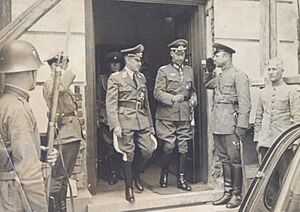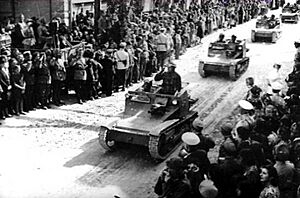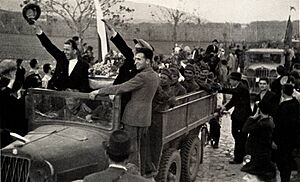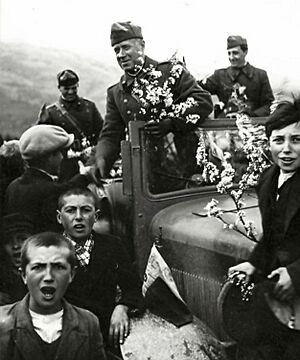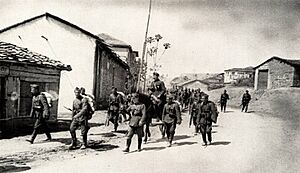Bulgaria during World War II facts for kids
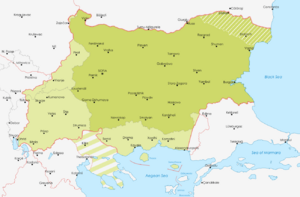
The history of Bulgaria during World War II is a story of changing sides. At first, Bulgaria stayed neutral from September 1939. Then, it joined the Axis Powers (like Germany and Italy) on March 1, 1941. Finally, it switched to the Allies (like the Soviet Union, Britain, and the United States) in the last year of the war.
Bulgaria's army took control of parts of Greece and Yugoslavia. These were areas Bulgaria wanted back, based on an old agreement from 1878. Bulgaria did not join Germany in fighting the Soviet Union, which started in June 1941. However, Bulgaria did declare war on Britain and the United States in December 1941.
The Soviet army entered Bulgaria on September 8, 1944. The very next day, Bulgaria declared war on Germany. During its time with the Axis, Bulgaria also took part in the Holocaust. This led to the deaths of 11,343 Jewish people from the newly occupied lands. However, 48,000 Jewish people from Bulgaria's main areas survived the war.
Contents
Staying Neutral (1939–1941)
When World War II began in September 1939, Bulgaria's government decided to stay neutral. Bulgaria hoped to get back lands it had lost in earlier wars without fighting. It also wanted to gain other areas where many Bulgarians lived. By 1939, Bulgaria was the only country defeated in World War I that had not gotten any land back.
Bulgaria was in a key location in the Balkans. This meant both sides in the war would try to influence it. Bulgaria relied on Germany for its economy, with 65% of its trade in 1939 being with Germany. Many Bulgarian army officers supported Germany. However, most ordinary people liked Russia.
On September 7, 1940, a part of Romania called Southern Dobruja was returned to Bulgaria. This happened because of pressure from Germany. This return of land made Bulgarians hopeful they could solve other land issues peacefully.
Laws Against Jewish People
In October 1940, a new law was proposed called the Law for the Protection of the Nation. This law was passed on Christmas Eve, 1940, and became official on January 23, 1941. It was similar to Germany's anti-Jewish laws.
This law stopped Jewish people from becoming Bulgarian citizens. It also set up rules to identify, separate, and limit the economic and social lives of Jewish people. For example, it restricted them from many jobs and public places.
The law also made it harder for Jewish refugees from other parts of Europe to enter Bulgaria. Even so, some Bulgarian diplomats helped about 1,000 foreign Jewish people enter Bulgaria. After April 1941, this law was also applied to the new lands Bulgaria occupied in Greece and Yugoslavia.
Germany wanted Bulgaria to join the Axis Powers. This was especially true as Germany planned to invade the Soviet Union. Bulgaria's king, Tsar Boris III, hesitated but eventually agreed.
Joining the Axis Powers (1941–1944)
After Italy failed to invade Greece, Nazi Germany asked Bulgaria to join the Tripartite Pact. This would allow German troops to cross Bulgaria to attack Greece. Bulgaria's prime minister signed the pact on March 1, 1941. German soldiers entered Bulgaria the same day.
King Boris III and Prime Minister Bogdan Filov admired Adolf Hitler. With the Soviet Union having a non-aggression pact with Germany, most Bulgarians did not strongly oppose this decision.
Taking New Territories
On April 6, 1941, Bulgaria's army did not directly join the invasions of Yugoslavia or Greece. Instead, they waited to occupy the lands they wanted after these countries surrendered. Yugoslavia surrendered on April 17, and Bulgaria's army entered on April 19. Greece surrendered on April 30, and Bulgaria began its occupation that day.
Bulgaria took control of most of Yugoslav Macedonia, Pomoravlje, Eastern Macedonia, and Western Thrace. These areas had been lost by Bulgaria in 1918. The Bulgarians called King Boris "King Unifier" because he brought these lands back.
In Macedonia, many people at first welcomed being part of Bulgaria. They had felt unfairly treated by Yugoslavia. Bulgaria tried to make these areas more Bulgarian. They built new schools and a university in Skopje. They also tried to make the local church part of the Bulgarian church.
In Thrace, there was more resistance. Bulgaria tried to encourage Bulgarians to move there and replace Greeks who had left. In September 1941, a revolt against Bulgarian rule in Drama, Greece, led to about 1,600 deaths.
The "Law for the Protection of the Nation" meant that Jewish people in these new territories could not become Bulgarian citizens. They were given special identity cards. This made them stateless, meaning they had no country to protect them.
Bulgarian Troops in Serbia
To protect important roads and railways, Germany started using Bulgarian troops in large parts of occupied Serbia. These troops were under German command. This happened in phases, starting in December 1941.
By July 1943, Bulgarian troops controlled most of Serbia, except for the area around Belgrade and some border regions. This allowed German forces to focus on other battles.
Bulgaria's Role in the War
Bulgaria did not join Germany's invasion of the Soviet Union in June 1941. King Boris III believed the Bulgarian army was not ready to fight the Soviet army far from home. He also thought Bulgarian soldiers would not want to fight their former Russian allies. Bulgaria's military was also needed to protect against threats from Turkey or an Allied landing in Greece.
Bulgaria did declare war on Britain and the United States on December 13, 1941. This led to Allied air raids on Sofia and other Bulgarian cities starting in 1941. The Bulgarian air force shot down some Allied planes flying over Bulgaria to attack oil fields in Romania. Captured Allied airmen were held as prisoners of war.
After Germany failed to defeat the Soviet Union, and the US joined the Allies, it became clear the Axis might lose. In August 1942, different groups formed the Fatherland Front to resist the pro-German government.
King Boris III died suddenly in August 1943, at age 49. There were rumors he was poisoned, but later studies showed he died of a heart attack. His six-year-old son, Simeon II, became king. A council ruled for him. They also tried to find a way for Bulgaria to leave the war.
Allied bombings of Bulgarian cities increased in late 1943 and early 1944. Many people fled Sofia.
By April 1944, the Soviet Union put more pressure on Bulgaria to leave the Axis. Bulgaria had kept diplomatic ties with the Soviet Union even while allied with Germany. In June 1944, a new prime minister, Ivan Bagryanov, took over. He wanted to get Bulgaria out of the war before Soviet forces arrived.
However, on August 20, 1944, Soviet forces broke through German defenses in Romania and moved towards Bulgaria. On August 23, Romania left the Axis and declared war on Germany. This allowed Soviet troops to cross Romania into Bulgaria.
On August 27, Bulgaria declared neutrality. Bagryanov tried to help German troops leave the country. But the Fatherland Front wanted Bulgaria to declare war on Germany. On September 5, the Soviet Union declared war on Bulgaria. Soviet forces crossed the border on September 8. The Bulgarian army did not resist.
The Holocaust in Bulgaria
During its alliance with Nazi Germany, Bulgaria's government passed laws against Jewish people and other minorities. In September 1939, about 4,000 Jewish people who were not Bulgarian citizens were expelled. Most eventually went to Palestine.
The "Law for the Protection of the Nation," which started in January 1941, excluded Jewish people from many jobs, universities, and public places. They had to carry special identity cards and could not marry Bulgarians.
When Bulgaria took new lands from Greece and Yugoslavia in 1941, its Jewish population grew to about 60,000. These Jewish people were not allowed to become Bulgarian citizens. Bulgarian authorities in these occupied areas handed over Jewish refugees to the German secret police. In March 1943, Bulgarian troops rounded up 11,343 Jewish people from occupied Greek and Yugoslav Macedonia. They were sent to concentration camps and then to Treblinka, where almost all were killed.
In Bulgaria's pre-war borders, Jewish men were forced into labor battalions instead of the regular army. These units were used for hard work on government projects. Conditions in these labor units became very strict, with little food or rest.
In spring 1943, the Bulgarian government planned to deport about 8,000 Jewish people from Sofia and other Bulgarian cities to Nazi extermination camps. However, protests from a member of parliament, Dimitar Peshev, and the Bulgarian Orthodox Church helped stop this plan. Instead, these Jewish people lost their property and were sent to live in rural areas. Jewish men were still forced into labor.
The German foreign minister, Joachim von Ribbentrop, asked King Boris why more Jewish people had not been sent for extermination. King Boris replied that he needed them for road construction. The laws against Jewish people in Bulgaria were not removed until August 30, 1944.
Joining the Allies
On September 8, 1944, Soviet forces crossed the Bulgarian border. That night, officers from the Zveno movement led a coup d'état (a sudden takeover of the government). They took control of key places in Sofia and arrested government ministers.
A new government, led by the Fatherland Front, was formed on September 9. Kimon Georgiev became prime minister. This new government immediately declared war on Germany and its allies. The German troops trying to invade Bulgaria were easily pushed back.
An agreement for peace with the Allies was signed on October 28, 1944, in Moscow.
In Macedonia, Bulgarian troops fought their way back to Bulgaria's old borders. Under the new pro-Communist government, three Bulgarian armies (about 455,000 soldiers) entered Yugoslavia in September 1944. They worked with Soviet and Yugoslav forces to block German troops retreating from Greece.
Southern and eastern Serbia and Macedonia were freed within a month. The Bulgarian First Army then continued into Hungary, pushing back the Germans, and entered Austria in April 1945. They met British forces in Austria on May 8, 1945, the day Germany surrendered.
After the War
After World War II, the Soviet Union occupied Bulgaria. A Communist government was set up in 1946, and the king was sent away. The People's Republic of Bulgaria was formed and lasted until 1990. Soviet troops stayed in Bulgaria until 1947. Bulgaria later joined the Warsaw Pact, a military alliance with the Soviet Union.
The peace treaties signed in Paris in 1947 confirmed that Southern Dobruja would remain part of Bulgaria. This made Bulgaria one of the few Axis countries that gained land after the war. However, the lands Bulgaria had occupied in Greek and Yugoslav Macedonia and Thrace were returned. About 150,000 Bulgarians were forced to leave Western Thrace.
After the war, most of Bulgaria's remaining Jewish population, about 50,000 people, left the country. Many went to Palestine and later to the new country of Israel.
Bulgarian Armed Forces
By the end of the war, Bulgaria had about 450,000 soldiers. Most of their military equipment was from Germany. By 1945, Bulgaria also received some Soviet weapons, mainly small arms.
Images for kids
 | Bessie Coleman |
 | Spann Watson |
 | Jill E. Brown |
 | Sherman W. White |


